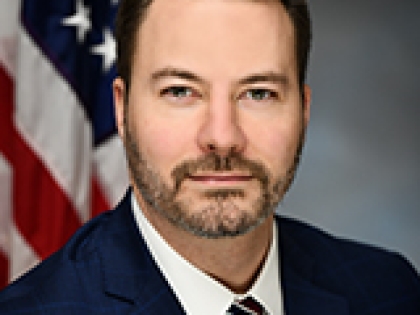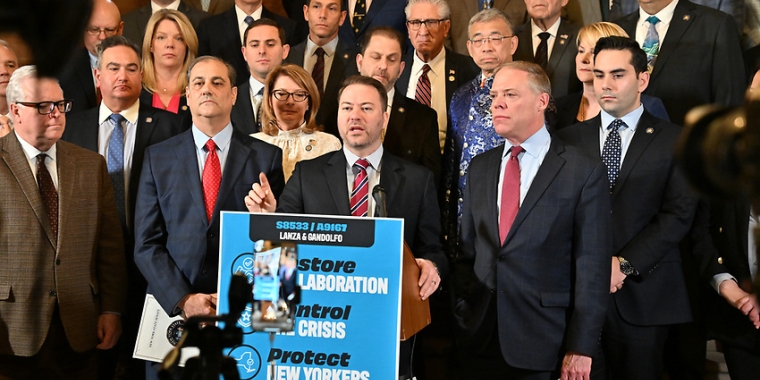
Ortt Hosts Public Hearing on Future of Sheltered Workshops
Antoinette DelBel
September 28, 2015
-
ISSUE:
- Developmental Disabilities

AMHERST – State Senator Rob Ortt (R,C,I – North Tonawanda), Chairman of the Mental Health and Developmental Disabilities Committee, tonight led the discussion on the growing concern surrounding the future of individuals with Intellectual and/or Developmental Disabilities (I/DD) when work centers, also known as sheltered workshops, begin to close.
New York State is phasing workshops out in an effort to comply with the state’s interpretation of the U.S. Supreme Court’s 1999 Olmstead decision. That ruling ensures people with disabilities receive services in the most integrated setting – rather than in institutions – appropriate to their needs.
This evening’s public hearing at the University at Buffalo’s North Campus follows a joint legislative budget hearing that Senator Ortt held earlier this year with the New York State Office for People With Developmental Disabilities (OPWDD) about the issue. During that hearing, Senator Ortt probed the OPWDD on its plan, and the Governor’s plan, to phase out sheltered workshops in the coming years. At Monday’s public hearing, Ortt sought further information on a clear, thought-out strategy and contingency plan to integrate those in the I/DD community in competitive employment.
“The developmentally disabled community deserves transparency,” said Senator Ortt. “Where does the phase-out plan stand? What business model would be implemented in order to cohesively shift these vulnerable individuals out of sheltered workshops and into competitive employment? What assurances do families and caregivers have, so that their loved ones don’t end up at home, unemployed? These are questions that I’ve been asking since the budget hearing in February, and I asked them again tonight. It’s now time for definitive answers in order to fully prepare these families for the next step.”
Senator Patrick Gallivan (R, C, I – Elma) said, “Sheltered workshops have played a vital role in allowing persons with disabilities the opportunity to build self-confidence and a sense of pride and purpose. As we move forward, it is important that we provide adequate alternatives which will allow individuals who cannot succeed in a competitive employment environment a chance to participate in meaningful programs that promote independence and self esteem.”
Senator Michael Ranzenhofer (R,C,I – Amherst) said, “New York's actions to end work centers has left a question mark over future employment opportunities for individuals with intellectual and developmental disabilities. The purpose of tonight's public hearing was to get real answers for advocates and parents. I commend Senator Ortt for his continued leadership on this important issue.
Monday’s public hearing included testimony from various agencies for the disabled and a parent. Marty Powers of Williamsville is the father of Tim Powers, 56, who is disabled and finds fulfillment at Southeast Works, which provides work programs and other services for adults with developmental disabilities.
“Tim has been employed at Southeast Works for more than 25 years,” said Powers. “Working there fills him with a sense of pride, dignity and accomplishment while cultivating camaraderie. For decades, my wife and I have fought for adequate services for the developmentally disabled, and will continue to fight for individuals like our son. But, that fight becomes harder and harder as we grow older. As long waiting lists for housing continue to be an issue, we worry about what will happen to our son when sheltered workshops are closed and we are no longer here to care for him.”
According to Southeast Works’ Program Services Director Lani Churley, there are roughly 8,000 individuals in New York State working in traditional workshop environments, and there are approximately 22 workshops in the Buffalo/Rochester region.
Southeast Works’ Program Services Director Lani Churley said, “Southeast Works supports options for individuals, and understand the need to evolve our service structure(s) while aiming to become more integrated with the non-disabled community. We encourage a closer look at increasing environmental options in order to maintain integrity and choice for individuals with the greatest needs.”
Todd Vaarwerk, Director of Advocacy and Public Policy at WNY Independent Living, says the state has an obligation to keep the I/DD community and agencies involved in the conversation, including offering disabled employees at sheltered workshops competitive wages.
“We must move away from the segregated and separate nature of the current sheltered workshop system,” said Vaarwerk. “With all this talk of $15 per hour for fast food workers, employment options must be integrated and pay a living wage. OPWDD and our state leaders must work with all the stakeholders, including persons with developmental disabilities and their families, to transform the current system to one that raises people to their best ability and supports them in maintaining it.”
Other speakers from tonight’s forum included:
Kevin Penberthy, New York State Office for People With Developmental Disabilities (OPWDD);
Michael Seereiter, NYS Rehabilitation Association;
Lindsay Miller, NYS Association on Independent Living;
Jennifer Monthie, Disability Rights New York;
David Zenger, Zenger Group;
Christopher Porter, Heritage Centers;
Corey Heritage, NYS Industries for the Disabled;
Greg Cavanaugh, Buffalo Felt Products;
Karen Duboy, Parent of a Son with Down Syndrome, who is Employed at Arc – Livingston/Wyoming Counties
Chris Peterson, Arc – Livingston/Wyoming Counties.



